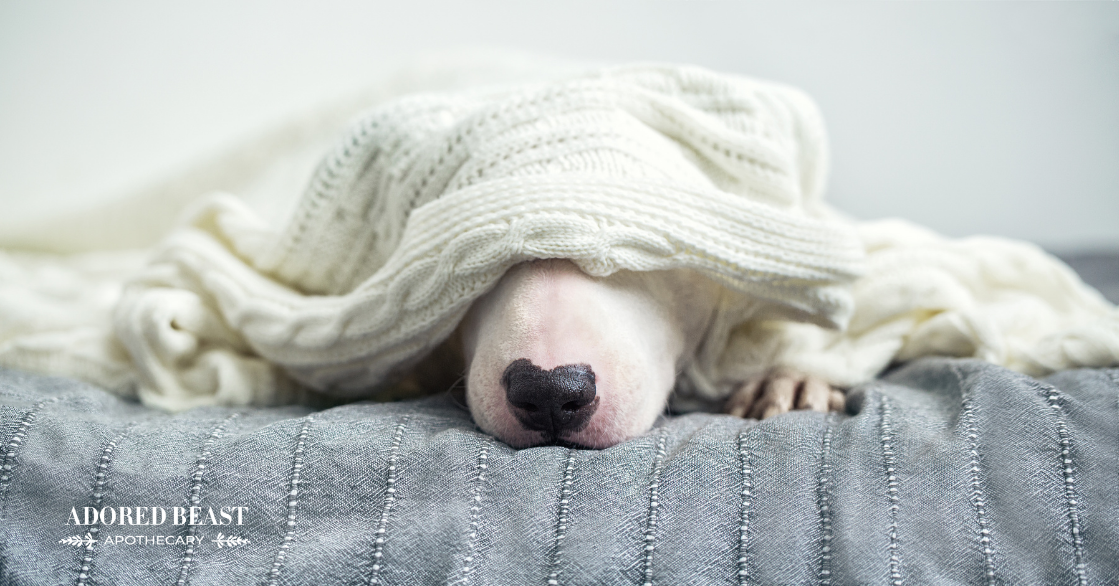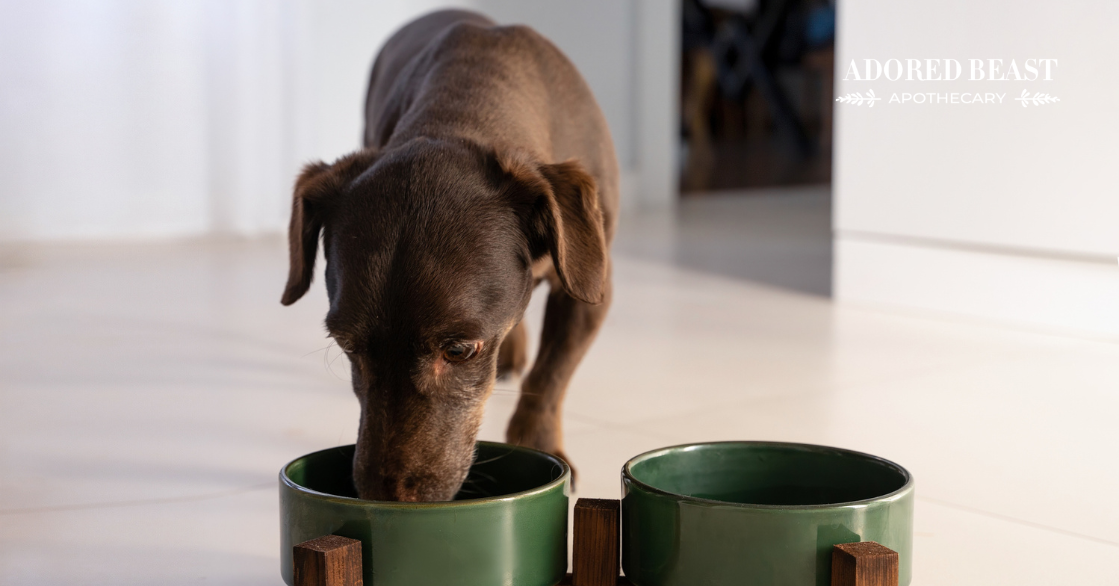Dog incontinence is such an important topic.
Every time I talk or write about anything that puts strain on the human-animal bond, it makes me sooo emotional (I am truly crying as I write this, I’m such a wuss!). But this needs to be talked about!
It hurts my heart to think about the dogs I’ve seen who’ve been banned from sleeping on the bed, left home from family outings in the car, not allowed on the couch or even in the living room because of it. I’ve even seen dogs actually be re-homed or euthanized because of this condition. They are abandoned and embarrassed…
Please understand that a dog would never intentionally urinate on their bed, on the couch, or while walking… but so many people discipline them as though they are misbehaving. That just is not the case!! Please, don’t ever get angry or make your dog feel bad for something they cannot control.
Today I want to go over the different reasons a dog might be peeing on her bed or other places, at odd times, and what you can do to help support your animal.
Spay Incontinence
There are many different reasons that your dog could be dribbling or leaking urine, but by far the most common is spay incontinence.
After spay or neuter, the reduction of sex hormones, predominately estrogen and testosterone, can cause a decrease in muscle strength of the urethral sphincter. This allows urine to dribble out, or sometimes you’ll even see a full-on emptying of the bladder.
The reason you often hear the term spay incontinence is because it is much more common in females than males.
Spay incontinence can come on slowly. For example, you may notice more grooming in the genital area, little dribbles as they are going up the stairs, or small wet spots when they get up from resting. This can eventually progress to a full emptying of their bladder as they sleep.
But spay incontinence is not the only type of dog incontinence…
Other Causes for Bladder Leakage
These are some of the other reasons you might be noticing wetness:
Bladder Infections
This can look like frequent urination, asking to go out and straining with just dribbles coming out, blood in urine, pungent smell of urine, or cloudy, thick, or stringy urine. Sometimes, with bladder infections, a dog just can’t hold their pee – it hurts too much! In this case, they honestly have no alternative except to urinate in the house.
Additionally, chronic or repeated bladder infections that have been treated conventionally can cause scaring, which can interfere with the sphincter closing and cause leakage.
[RELATED] For more on how to manage bladder infections in dogs and cats, read this post next!
Birth Defects
If your puppy or intact young dog is experiencing urinary leakage or having multiple accidents in the house, it could be something they were born with.
Spinal Cord Diseases and/or nerve damage
The spinal cord and the nervous system are very delicate and contribute to so much more than what we are educated on! Both are responsible for so many functions of the body.
I have seen urinary incontinence caused and cured by addressing the spinal cord and pudendal nerve. Anything from a bum spanking to the use of choke chains or corrective training (don’t even get me started on those) can cause all kinds of issues like collapsing tracheas, pituitary stalk injuries leading to adrenal diseases, to yes – urine leakage! Other contributing factors can stem from back trauma, degenerative myelopathy, or arthritis.
Bladder Overflow Caused by Underlying Disease
Conditions such as Cushing’s, diabetes, or hypothyroidism can cause your dog to be insatiable with water and overfill the bladder. If your dog is excessively thirsty and incontinent, it’s important to have your veterinarian check that out.
Stones, Polyps, and Tumors
These can look very much like the symptoms above in the bladder infection section. It’s important to know what it is going on from your veterinarian so you can work on it with the proper holistic tools!
In each of these cases, veterinary advice or intervention is necessary. It is always helpful to know exactly what is going on that might be causing dog incontinence so that you can approach it the right way.
Holistic Options for Dog Incontinence
I have seen these options work like hot damn and way better than conventional drugs!
(**For all you dog moms out there over the age of 35 – take heed of the recommendations in this article. Many of them are great for you too!)
1. Diet. Start by incorporating more high-quality protein and fat into the diet. As a dog ages, often pet parents are told to decrease their protein and fat. The problem is, this decreases things that are vital to the strength of the sphincter and pelvic muscles – protein, fat, and collagen! Adding bone broth or raw chicken feet will help to keep all muscles, joints, etc., healthier. I always incorporate this with all regimes below.
2. Homeopathy to the rescue! My go-to for dog incontinence is Phosphoric Acid 200C twice a day for 3- 5 days, then repeat as needed. I have been using this for almost 30 years for spay incontinence caused by spinal cord and nerve issues with great success.
3. Organs and glandulars. Try to can get organs and glands from cows, sheep, goats, like overies, testicles, uterus, and utters to feed once per week. Feed 1 tsp for small dogs, 2 tsp for medium dogs, and 1 tbsp for large dogs. There are some companies making organ and glandular support products for urinary issues like Standard Process.
4. Acupuncture, osteopathy, and chiropractics can all be used to support the central nervous system and spinal cord to function properly and realign mishaps caused by injury and inappropriate training habits.
5. Amino Acids. Amino acids help in many ways. They build muscle, make hormones and brain chemicals, they grow and repair bodily tissue, help to break down food, support the immune system, are a great energy source, and help to support normal digestion. My go-to here is phytoplankton. It has an incredibly diverse amino acid profile.
6. Biologically appropriate (non-synthetic) hormone replacement therapy. Speak to your veterinarian about this. It can be very useful, especially with cases of incontinence cause by spay or neuter.
7. Herbs and nutraceuticals. Many herbs and nutraceuticals soothe the bladder wall. I like marshmallow root (50 mg daily for an average size dog) and N-Acetyl Glucosamine (50 mg daily for an average size dog). Our Gut Soothe and Easy Peesy Protocol are both good for this.
Managing Dog Incontinence
It’s unbelievable how much less stressful it is if you are proactive. And there are plenty of ways to do this.
In my experience, after hard exercise is one of the greatest times for leakage. The body is much more relaxed and the muscles are fatigued. If your dog is prone to leakage, use diapers (ones that fit well up against the legs but don’t cut off the circulation) in these times.
Always take your dog out just before you leave the house, as soon as you come home, and right before bedtime.
To protect bedding and furniture from dribbles, there are many different waterproof bed covers or pads you can purchase. They range from disposable to soft cotton mattress covers for senior citizens (you can get them from the drug store). You can put this on your bed, your dog’s bed, or your sofa. This way, they can stay a beloved member of the family until you get the leakage under control. Even if you have a particularly stressful or high intensity exercise day, pulling one of these pads or sheets out is just a good precautionary measure to reduce any upset in the family and embarrassment with your dog.
As with ALL chronic issues the best possible way to prevent and help to alleviate the problem once it has occurred is by keeping your dog as constituently as healthy as you can. You can do this by feeding a great diet, creating a healthy gut with pre and probiotics, digestive enzymes, healthy fats, amino acids, and antioxidants. Work with your holistic vet.
And always remember: these are accidents. Your dog isn’t doing this on purpose. Don’t give them trouble for something they can’t control. Make sure that you’re giving them quality one-on-one time with you and lots and lots of love. Make sure that they know they’re a cherished member of the family. This will go a long way to create the health and longevity you want for your beloved dog.












